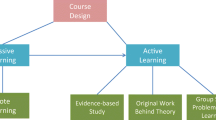Abstract
Training in fundamental laboratory methodologies is valuable to medical students because it enables them to understand the published literature, critically evaluate clinical studies, and make informed decisions regarding patient care. It also prepares them for research opportunities that may complement their medical practice. The National College of Natural Medicine (NCNM)’s Master of Science in Integrative Medicine Research (MSiMR) program has developed an Introduction to Laboratory Methods course. The objective of the course is to train clinical students how to perform basic laboratory skills, analyze and manage data, and judiciously assess biomedical studies. Here, we describe the course development and implementation as it applies to complementary and integrative medicine students.
Similar content being viewed by others
References
Briggs JP, Killen J. Perspectives on complementary and alternative medicine research. JAMA: J Am Med Assoc. 2013;310(7):691–2.
Kreitzer MJ, Sierpina V, Maiers M, Delagran L, Baldwin L, Evans R, et al. Ways of knowing: integrating research into CAM education and holism into conventional health professional education. Explore. 2008;4(4):278–81.
Lasater K, Salanti S, Fleishman S, Coletto J, Jin H, Lore R, et al. Learning activities to enhance research literacy in a CAM college curriculum. Altern Ther Health Med. 2009;15(4):46–54.
Lee MY, Benn R, Wimsatt L, Cornman J, Hedgecock J, Gerik S, et al. Integrating complementary and alternative medicine instruction into health professions education: organizational and instructional strategies. Acad Med: J Assoc Am Med Coll. 2007;82(10):939–45.
Nedrow AR, Heitkemper M, Frenkel M, Mann D, Wayne P, Hughes E. Collaborations between allopathic and complementary and alternative medicine health professionals: four initiatives. Acad Med: J Assoc Am Med Coll. 2007;82(10):962–6.
Butler D. Electronic notebooks: a new leaf. Nature. 2005;436(7047):20–1.
Mikolai J, Erlandsen A, Murison A, Brown KA, Gregory WL, Raman-Caplan P, et al. In vivo effects of Ashwagandha (Withania somnifera) extract on the activation of lymphocytes. J Altern Complement Med. 2009;15(4):423–30.
Zick SM, Benn R. Bridging CAM practice and research: teaching CAM practitioners about research methodology. Altern Ther Health Med. 2004;10(3):50–6.
Acknowledgments
This work was supported NIH NIH/NCCAM grant: 2-R25AT002878-01A1.
Author information
Authors and Affiliations
Corresponding author
Rights and permissions
About this article
Cite this article
Vasilevsky, N., Schafer, M., Tibbitts, D. et al. Curriculum Development of a Research Laboratory Methodology Course for Complementary and Integrative Medicine Students. Med.Sci.Educ. 25, 171–175 (2015). https://doi.org/10.1007/s40670-015-0113-y
Published:
Issue Date:
DOI: https://doi.org/10.1007/s40670-015-0113-y




